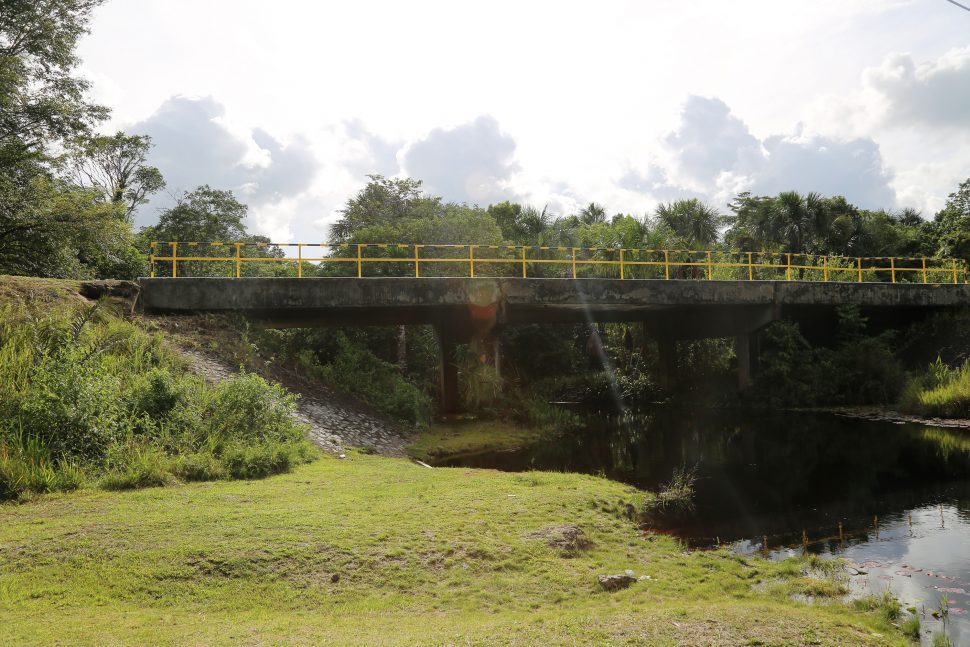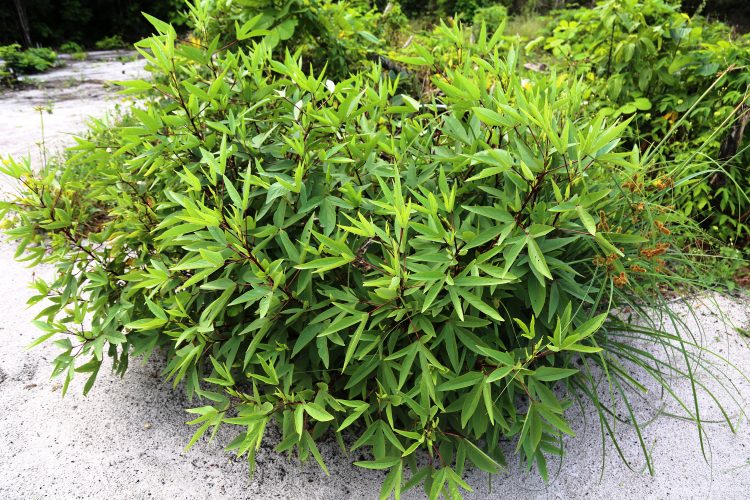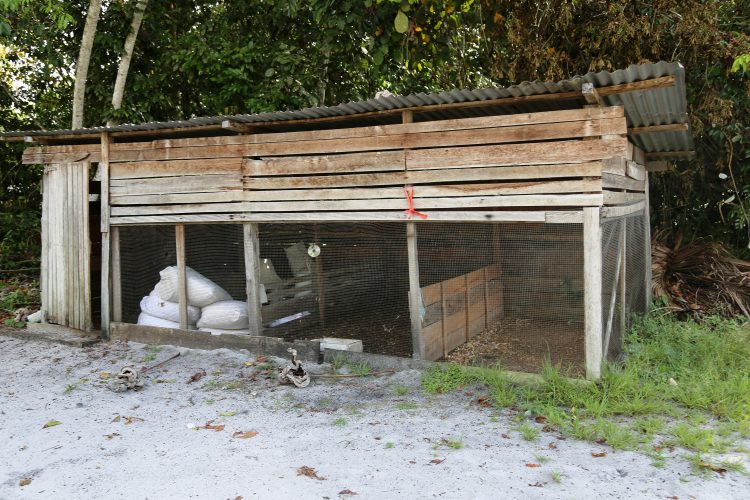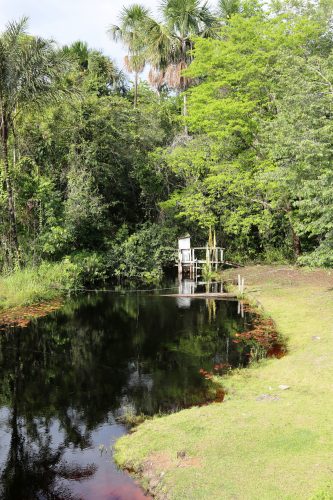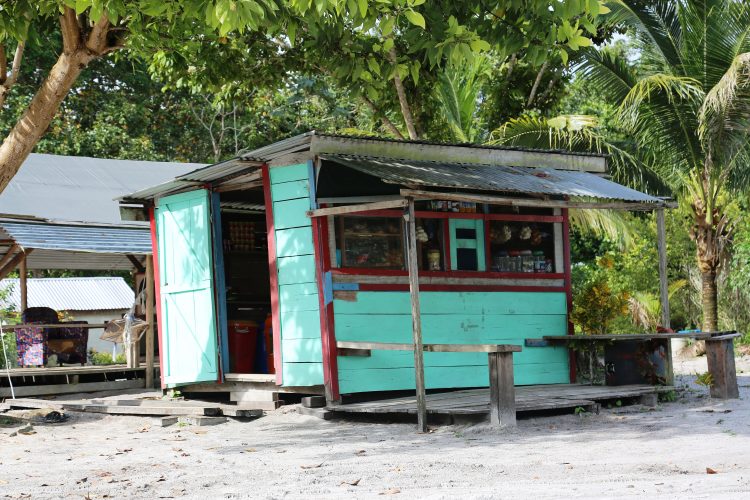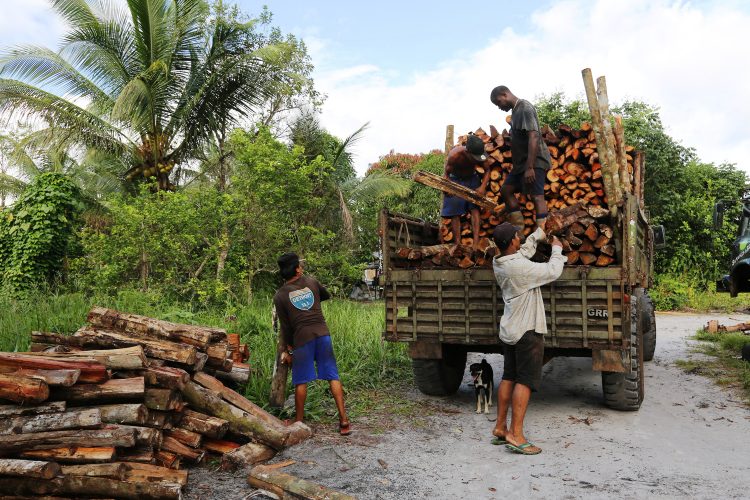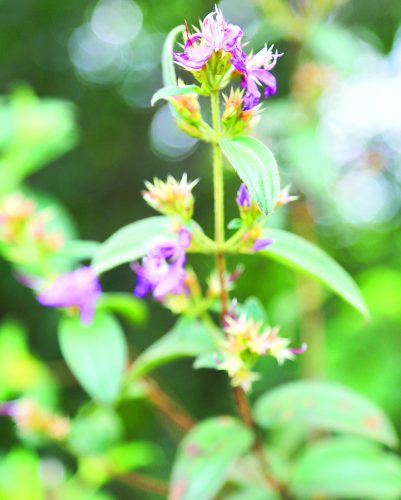Loo Creek spans a vast area on the Linden/Soesdyke Highway but is sparsely populated. The few families who have settled there over the years have acquired acres of land for living and farming purposes. The village’s name is the same as the creek which is essential to the livelihood of the people.
Their main economic activities are burning coals, planting ground provisions and working in the interior. One particular family, the Tulshis, cuts t-shore logs to be used as reinforcements in building concrete structures.
Ramsaran Tulshi better known as ‘Maraj’ moved to Loo Creek with his family 15 years ago. He hails from a village in the Demerara River called Loo Lands in Clemwood, which is now a ghost town. The people who once lived in Clemwood have long since all migrated in search of work and educational opportunities, according to Maraj. He also stated that Clemwood once had a larger population than Loo Creek.
“In the Demerara River was a better life. Financially things were better; we would plant bananas and sell at Linden and at Queenstown,” Maraj said. However, he made the decision to move for the sake of his children and their education. “My brother had this place in a government concession then he gave it up and I applied for it,” he added.
The instant they arrived, Maraj shared, he and his sons immediately started cutting down the dense jungle to prepare for building. The clearing of the area took two months.
As regards reptiles in the area, he said, snakes are not as prevalent as where he lived before. “Sometimes you find a snake coil up here, sometimes there, sometimes as long as 25 feet. It name kamacushi, the common name is konocushi. Some people call it the bush master but it’s not a bush master. I am a bush man and I know the difference. I would say is like we own cobra because it stay like the spitting cobra. It would spray venom on you. I see that plenty here. I know about three [persons] that it bite and all three die,” he said.
Earlier that same day his grandson, Sarjoo, killed a sleeping labaria. Sarjoo’s teenage sister was cleaning the chicken pen; the family had just sold the chickens. With her spade, she scooped up a labaria and did not realize it until she emptied the spade into a pile of manure; only then did she start screaming. Fortunately, she was not bitten.
Though it is rare, Loo Creek residents also face the prospect of having run-ins with jaguars. In 2015, Maraj said, he was forced to kill a jaguar after it had made off with three of his dogs. This incident brought him under much criticism, more so because the jaguar is the national animal. Maraj argued that he lives in Loo Creek and understands what it means to have a jaguar prowling the area and was not going to sit and listen to persons who said that the animal was harmless, more than that he was not going to sit around while the cat made off with one of his grandchildren.
Speaking of his grandchildren, he said that they attend Linden Foundation Secondary and Silver Hill Primary. Transportation to their schools is one of the main challenges. Usually there are two cars working the school route. However, the driver of one of the cars after dropping two school girls off, drove past the home of the remaining girl in his car then tried to rape her. She managed to escape and was hurrying along the highway when she was picked up by Maraj’s son who was on his way home in his truck. He took her to her home.
Maraj is pleading for a school bus because the cars are not always available and sometimes children are forced to stand on the road and wait on transportation for long periods.
Another thing that would be beneficial to the community is a health post and readily available medications. Just the day prior to our interview, Maraj was picking up logs when he had a minor heart attack. Luckily, he had meds available but there are times, he noted, when he would go to the hospital and there is not readily available medication.
The area where Maraj lives has 13 houses situated short distances apart. Most of the families living in these houses are his relatives. Neither they nor other villagers have access to potable water or electricity. When it does not rain, and they are low on water, Maraj’s family takes the truck and fills black tanks with water from the creek; the water is used for drinking, washing and bathing.
Sixty-four-year-old Lena Clarke sat on her step looking out to the highway. She is originally from Mahaicony, but left decades ago settling first in Georgetown before moving to live in Loo Creek where she has been for the last 40 years. “I used to live in town and my married husband died and I move up here with my children and grandchildren. I choose to come here because I wanted to do agriculture and I wanted to do charcoal too,” she said.
“I used to plant with my second husband on the farm but then he died nine years ago. I stopped after he took sick with stroke and sugar.”
Clarke added that since the current government has come into power her land was taken over and given to other people though she paid a bi-annual fee for it. “I had 2,500 acres of land and they take back the land. I pay lands and survey inspection fee two times a year and they still take the land,” she lamented.
On part of the land she reared meat birds until some time ago when she fell on her knee and permanently damaged it. Her first husband, she said, worked with the City Constabulary for quite a number of years, yet when she applied for benefits from the National Insurance Scheme, officials there said they had a flood and could not find the records and that they would have most likely been damaged. However, she is still hoping something can come out of it and though it has been a year now since she has been running back and forth, she will keep trying.
Some days, Clarke shared, when she is at home just pondering the future, she contemplates moving back to Mahaicony. Other days, she thinks about her deceased daughter who would have been 30 years old now. Clarke said her daughter was three weeks old and normal when she received the BGC vaccine. She then became handicapped and never spoke a word or learnt to walk a step; she succumbed 13 years later on a Phagwah Day, Clarke recalled. Since then, Phagwah brings painful memories for her.
She uses rain water for drinking and cooking and has a solar panel for the purpose of lights.
“If this place develop with light and water and poor people are given loans to open small businesses, I would stay on. My son and his wife does travel from here to town every day for work. Work ain’t deh hay. People going away. Loo Creek had more people, but people move out,” she lamented.
Lurleen Clarke is Lena’s daughter. She was born in Georgetown and followed her mother to Loo Creek on February 19, 1998; she lives a short distance away from her mother.
She had lived with her family in Georgetown and would visit her mother and stepfather during school vacation. She spent most of her visits in the backdam with them.
“I would go into the back dam to work to burn charcoal; I was fascinated with it. I was my mother right hand. I would work along with her and my stepfather,” she shared.
By the time she moved, her children were in school and she was a part of the PTA, out of which a regional body of the PTA was formed. She represented schools from Moblissa to Eccles. This, of course, was voluntary. Later on, through the same PTA body, she was introduced to a senior officer who enquired about her life and realizing she was a single mom and knowing she needed more to get by apart from working in the back dam, she encouraged her to write an exam which she did and passed. Upon passing she was posted in the interior to work as a security guard. Currently she works at Big ‘T’ Resort at Yarrowkabra.
“Loo Creek is a peaceful village and a much different experience from living in Georgetown. Here everybody know everybody; it was refreshing for me,” she related.
The woman said that even though she had lived in the city, where there was access to electricity and water, she personally had neither and had depended on getting water from a neighbour. Lurleen added that she had to also ensure she got her share of the water before the neighbour left for work. Now that she lives in Loo Creek it is not much different; she depends on the rain or the creek and added that she conserves even more now. “During the dry season when it’s not raining the Marajs would full their tanks from the creek and come around in their truck sharing water; they don’t charge.” Maraj, she acknowledged, has been helpful to the community especially in providing jobs; two of her brothers work with him.
“Living here is also a good thing because we get to manage our finances because we buy in bulk. We have space to plant and we don’t have to pay bills because we have solar panels. However, we would like to have potable water,” she said.
The woman also mentioned that although they have land space she would buy most of her greens since the acoushi ants eats what she plants. She still has a few plants in her yard including a bitter cassava plant.
Job opportunities for her is one of the major disadvantages. “We need job opportunities here, that’s a top priority. Lots of females and males are not working and men would have to go work in the interior and you have to know who you going with because not everybody will pay. Some persons work all the way in Georgetown for $7,000 a week… that’s not even transportation money for the week. There’s a Digicel tower and they change security guards a few times already and they are not choosing people right in the area. I went there a few times for a job because I have a security certificate and they never know when the supervisor coming by or don’t have a number I could call,” Lurleen lamented.
The younger Clarke mentioned that she would very much like to see a business of some kind or a few that could provide permanent jobs for the people of Loo Creek and others living along the highway as well as employees being paid in full and not underpaid.
